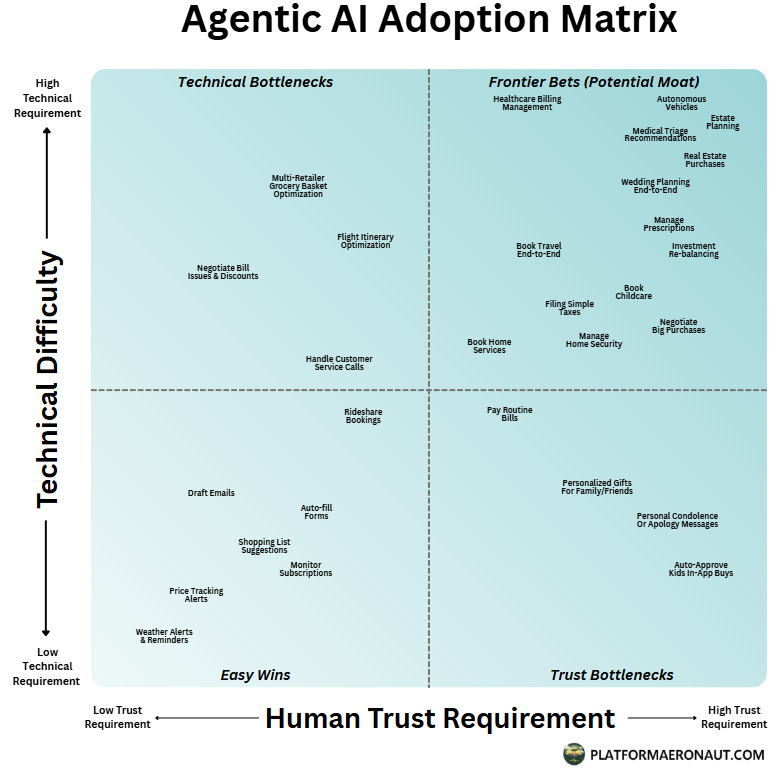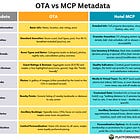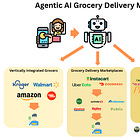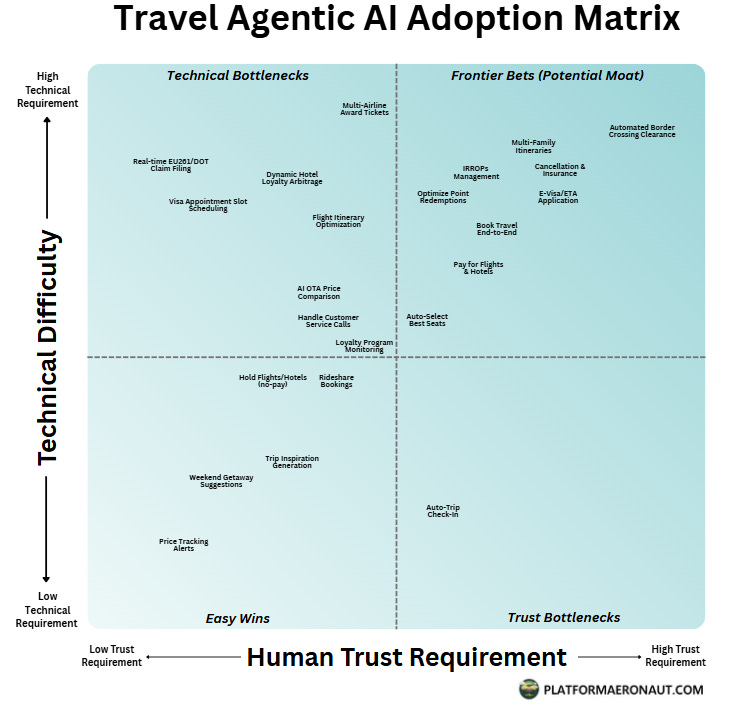The Agentic AI Adoption Matrix: Consumer & Travel
Exploring adoption challenges for Agentic AI through the lens of trust vs technical difficulty with a deep dive into travel.
Agentic AI is the defining buzzword of 2025. Everybody is talking about systems that don’t just answer queries, but that act on our behalf. The problem is that you can’t just apply agentic AI evenly across the world of problems. The real gating factors aren’t just capability, but human trust and technical feasibility. I’d happily let my AI agent cancel a $12.99 Paramount+ subscription, but I’d think twice before letting it buy furniture for my living room.
There’s a million companies both startup and incumbents throwing everything at the wall to see what sticks, but if you look at it from a first principles perspective you can identify where the sweet spots are to focus on. I’ve created a framework and mapped some common agentic AI solutions onto it:
Agentic AI Adoption: Trust vs Technical Ability
My goal with this is to help identify where adoption will be fast, where it will lag, and where the frontier bets lie that are most likely to result in competitive moats for agentic AI service providers. It’s by no means exhaustive but is a good mental framework to start with.
The Framework: Trust vs Complexity
I’ve broken it along two axes: Human Trust Requirement and Technical Difficulty. The Human Trust Requirement is simply how much confidence a person needs to hand this task over to an AI agent. I’m much more willing to let my AI agent monitor my TV and Netflix subscriptions than I am to let it negotiate a vehicle purchase for me. Consumer willingness is super important in terms of speed of adoption.
Technical Difficulty is simply how hard is it to have to AI agent actually complete the task. This isn’t necessarily just reasoning models or actions, but it’s the reality of hooking up pipes, APIs, MCP, payment pipes, and B2B trust. It’s a lot easier for an AI agent to draft me an email within Gmail than it is to navigate healthcare management billing, refunds, coding, and authorizations.
Generally I’ve broken things down into four quadrants:
✅ Easy Wins (Low Trust, Low Technical) are simple things like setting weather alerts, price tracking, or form auto-fill. Letting gmail auto-draft an email response fits in here as well. These are likely to be commoditized but they can feel like magic to consumers and result in easy and rapid adoption.
🧍Trust Bottlenecks (High Trust, Low Technical) are very personal areas where a human might want control but doesn’t really have technical challenges. Imagine writing a condolence text to a close friend or buying a Christmas gift for your daughter. These are likely to be offered but difficult to either build a moat or be commoditized.
🟡 Technical Bottlenecks (Low Trust, High Technical) are problems that I’m more than willing to let an AI agent manage but are pretty complicated in reality. Imagine an AI negotiating my Comcast bill and navigating the complex web of rules and regulations. I don’t really care about how my agent acts, but success is dependent upon technical details. One part that fits in here is the potential for price parity and comparison across various grocers for grocery delivery.
🔮 Frontier Bets (High Trust, High Technical) are the key unlocks everybody talks about when it comes to Agentic AI. I want a personal AI agent that books my travel, or plans a wedding, or manages my healthcare and estate. It’s both technically complex and requires a high degree of trust. Unlocking this quadrant for companies is the key to building multi-trillion dollar businesses as it will be the place where competitive moats are built with large applicability to the global population.
Travel: The Perfect Stress Test for Agentic AI
Many AI researchers see travel as the ideal test use case for Agentic AI. The logical and emotional view that your personal agent can discover, book, and manage travel for you makes obvious sense. Travel is highly emotional and experiential, there’s high monetary stakes, and it’s a messy ecosystem (airlines, hotels, insurers, governments) and so it sits across the entire matrix.
Travel is a $9 trillion industry, yet it still runs on brittle integrations and 1990s code. If Agentic AI can jump the tech gap and enable true agentic action it could be absolutely enormous and is the perfect test case for AI.
Below I’ve put together a travel specific Agentic AI matrix on the same axis as above.
I want to do a quick walkthrough of this to help better explain some of the potential use cases and where they fall on the matrix.
💭 Inspiration & Discovery (Low Trust, Medium Technical)
Solutions such as weekend getaway suggestions and trip inspiration are pretty straightforward. Discovery has a low trust requirement as there’s no stakes for the consumer. If the suggestions suck then it’s not a huge deal. From a technical perspective it’s moderately difficulty because despite LLMs doing a decent job, the next step is true personalization and memory about the individual.
Who Is Focused on This? Pretty much everybody, from OpenAI to Layla backed by former Skyscanner and Booking veterans.
Who Will Win? Frontier Models (ChatGPT, Claude)
🏨 Core Booking & Optimization (Medium Trust, High Technical)
Actually booking flights, selecting the best seats, optimizing flight itineraries, paying for flights, and re-booking are a bit more complex. This is the start of true agentic behavior where as a consumer I need to trust the agent will make good decisions, but there’s also a wide spread of technical requirements, APIs, Model Context Protocol (MCP), and integrations with data sources like OTAs, Hotels, Airline websites, and even the GDS to enable this. This is where you start to get real consumer value. We know the frontier model companies and the OTAs are trying to enable this, and the size of the pie is really large. I’d expect most of the VC and company investment dollars to flow into these use cases.
Who Is Focused on This? OTAs, Frontier Model Providers, Various Startups
Who Will Win? TBD, but gate keepers will likely be horizontal agent providers that control the consumer entry point and OTAs will potentially be disintermediated.
‼️ Disruption Handling (Med-High Trust, High Technical)
When faced with IRROPs, lost baggage, cancellations, and insurance claims, it’s often emotional and complex and requires high trust. From a technical perspective it also involves integrating with often antiquated and proprietary data sources at hotels, airlines, and other suppliers. This will be one of the last parts to be turned on for Agentic AI as it’s more edge cases and lower TAM than straight up booking or even travel discovery.
We have seen some focus here from businesses like AirHelp who try to automate flight delay compensation for consumers, but it’ll have to be stepped up to be integrated within an AI agent.
Who is Focused on This? This will be important for the suppliers (think United Airlines)
Who Will Win? Airlines will defend ownership of disruption handling as a moat or loyalty perk and they own the customer and data already.
💰Loyalty & Value Unlocking (Low-Med Trust, High Technical)
With millions of monthly visitors to websites like The Points Guy and Point.me it’s no surprise that consumers will want their personal agent to manage loyalty and value unlock. It doesn’t need much trust from my for my agent to check multi-airline award tickets or optimize point redemptions for me, but it’s wildly complex from a tech integration and data source perspective.
Who is Focused on This? Point.me, Seats.aero, and AwardWallet are nibbling here but no one has cracked it or really taken a run at the problem yet.
Who Will Win? TBD but depends who can win over the suppliers (or if anybody really can)
🏛️ Border & Safety Frontier (Very High Trust, Very High Technical)
We’re just starting to see the inklings of automation in visas and border-crossing clearance. Super long term I imagine we will see agentic data communication and processing to get your e-visa/ETA and further out get automated border crossing where an agent can integrate and co-operate with biometrics and sovereignty.
Consumers love inspiration but fear border crossings. Max fear → Max trust required, and working with Governments → Max Technical Difficulty.
Who is Focused on This? Nobody at the moment
Who Will Win? Whoever can win government contracts, Microsoft? Palantir?
Lessons for Travel Leaders
Adoption is likely to move unevenly. Low trust/low tech solutions will be easy wins and we’re already seeing agentic travel discovery and inspiration. The real battlegrounds will be on actual agentic facilitation of travel bookings, loyalty optimization, and pricing perfection. Put simply: easy wins will land fast, but real moats live in frontier bets.
Winning here will require a lot of supplier integrations (whether it’s GDS, loyalty systems, OTAs, insurers, the airlines and hotel themselves, or individual hotel MCPs), a lot of consumer education and build up of trust, and transparent and easily adjustable guardrails (spending caps, undo ability, etc).
Agentic AI is real, but adoption really does hinge on this trust vs complexity scale and travel is the ideal proving ground. The winners will not just launch features or point solutions, but design trust scaffolding and tackle the hardest integration gaps.
The Future of Travel AI won’t be decided by what’s technically possible, but by what travelers actually trust their agents to do when money, safety, or identity are on the line.
Tickers Mentioned: BKNG 0.69%↑ EXPE 0.22%↑ ABNB -0.10%↓ MSFT -0.40%↓ TRIP 0.23%↑ TRVG -2.58%↓ MAR -0.57%↓ H -1.56%↓ HLT -0.46%↓ GOOGL 1.57%↑ PLTR 0.00%↑
The information presented in this newsletter is the opinion of the author and does not reflect the view of any other person or entity, including Altimeter Capital Management, LP ("Altimeter"). The information provided is believed to be from reliable sources but no liability is accepted for any inaccuracies. This is for informational purposes and should not be construed as investment advice or an investment recommendation. Past performance is no guarantee of future performance. Altimeter is an investment adviser registered with the U.S. Securities and Exchange Commission. Registration does not imply a certain level of skill or training. Altimeter and its clients trade in public securities and have made and/or may make investments in or investment decisions relating to the companies referenced herein. The views expressed herein are those of the author and not of Altimeter or its clients, which reserve the right to make investment decisions or engage in trading activity that would be (or could be construed as) consistent and/or inconsistent with the views expressed herein.
This post and the information presented are intended for informational purposes only. The views expressed herein are the author’s alone and do not constitute an offer to sell, or a recommendation to purchase, or a solicitation of an offer to buy, any security, nor a recommendation for any investment product or service. While certain information contained herein has been obtained from sources believed to be reliable, neither the author nor any of his employers or their affiliates have independently verified this information, and its accuracy and completeness cannot be guaranteed. Accordingly, no representation or warranty, express or implied, is made as to, and no reliance should be placed on, the fairness, accuracy, timeliness or completeness of this information. The author and all employers and their affiliated persons assume no liability for this information and no obligation to update the information or analysis contained herein in the future.






great way to express the adoption, interesting to apply this t enterprise functions, where trust and technical difficulty are both perceived to be challenges
You and Jamin are unreal! Great stuff